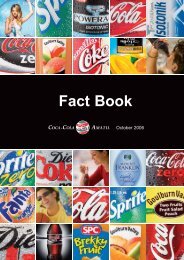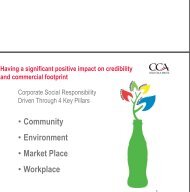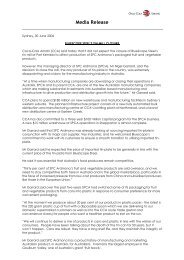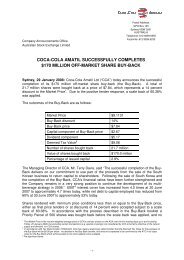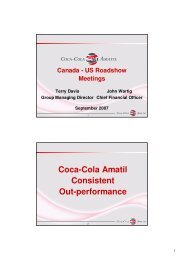2006 Sustainability Report - Coca-Cola Amatil
2006 Sustainability Report - Coca-Cola Amatil
2006 Sustainability Report - Coca-Cola Amatil
Create successful ePaper yourself
Turn your PDF publications into a flip-book with our unique Google optimized e-Paper software.
Marketplace<br />
Principles<br />
• We are committed to earning the<br />
trust of our consumers by providing<br />
safe, high quality, relevant products<br />
and services that satisfy their<br />
beverage needs and fit their lifestyles.<br />
• We are committed to marketing and<br />
communicating credibly and honestly<br />
with respect for and across social,<br />
economic, and cultural backgrounds.<br />
• We are committed to supporting<br />
our business partners, both local<br />
and global, by building sustainable,<br />
reliable, consistent, mutually<br />
beneficial relationships.<br />
CCA recognises public concern about<br />
health issues, particularly in relation to<br />
kilojoule-dense diets and the need for<br />
more physical activity in the community.<br />
To meet changing consumer needs<br />
we have significantly diversified our<br />
product range. Today water, fruit<br />
juice, coffee, sports and energy drinks,<br />
sugar-free soft drinks and SPCA’s fruit<br />
and vegetable products contribute to<br />
more than 30% of our revenue,<br />
compared to just 5% in 2001.<br />
A key changing consumer need is the<br />
move to low-kilojoule beverages. This<br />
was evident in the hugely successful<br />
Australia and New Zealand launch of<br />
<strong>Coca</strong>-<strong>Cola</strong> Zero, a sugar-free lowkilojoule<br />
beverage. <strong>Coca</strong>-<strong>Cola</strong> Zero<br />
captured and maintained 13% of the<br />
total cola category and has created a<br />
new segment in the Australian and<br />
New Zealand markets.<br />
Diet Coke and <strong>Coca</strong>-<strong>Cola</strong> Zero, both<br />
sugar-free, now represent 34% of Coke<br />
volume, up from only 20% in 2000.<br />
Product Development<br />
In <strong>2006</strong> CCA focused on growing<br />
its functional/low kilojoule beverages,<br />
including water, low kilojoule and<br />
no kilojoule brand and product<br />
extensions including <strong>Coca</strong>-<strong>Cola</strong> Zero,<br />
diet Coke, Sprite Zero, Pump, Pumped<br />
flavoured waters, Mount Franklin,<br />
Frestea Jasmine and Frestea Green<br />
iced teas.<br />
In Australia, 43% of sales have been<br />
from these beverages, and 50% of<br />
the marketing budget was spent on<br />
promoting them.<br />
While the range of our products<br />
and the volume of beverages sold<br />
in Australia has expanded markedly<br />
since 2002, we have at the same time<br />
lowered the energy density of our<br />
product portfolio.<br />
The shift in the product portfolio<br />
to lower kilojoule beverages has<br />
resulted in a 13.9% drop in kilojoule<br />
consumption per capita in the<br />
Australian market.<br />
There has also been a focus on<br />
smaller serving sizes. In Australia<br />
300ml slimline cans, 250ml glass<br />
bottles, and 250ml grocery snack<br />
packs for carbonated soft drinks<br />
have been successfully introduced.<br />
Other successful products launched<br />
in Australia included Goulburn Valley<br />
chilled juices and 220 gram Goulburn<br />
Valley fruit snacks. Two flavoured<br />
waters, Pumped, drove total Pump<br />
volumes over 20% in the second half<br />
of the year, becoming the number one<br />
and two selling functional flavoured<br />
waters in Australia.<br />
In Indonesia successful new<br />
products included Frestea Frutcy,<br />
Frestea Green Tea and Powerade<br />
Isotonic. In New Zealand Kiwi Blue<br />
water and Powerade both grew volume<br />
by more than 20%.<br />
19



